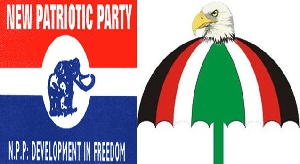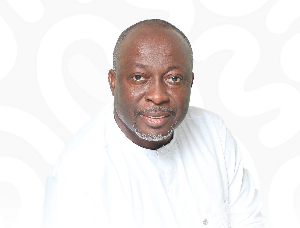Naturally political parties do not spring in a vacuum. They are products of impressive societies comprising many nations with defined geographical boundaries and sovereignties. Such societies are normally characterized with bustling cities, towns and deserted villages with unique cultures. Ghana comprising many nations [implying ethnic groups] like Asante, Ewe, Dagomba, Ga and others is an example of such societies.
If a political party is a product of society, why then must we sacrifice the security of the nation on unholy altars of some individuals’ ego-centric convenience? This means the imperative need of raising the bar of nationalism and patriotism beyond party loyalty cannot not be gainsaid.
Our ancestors had lived peacefully without political parties. The upsurge of political hooliganism in Ghana must be a source of consternation to everyone. Is it not pernicious to our democratic accolades? Hooliganism does not only threaten the security of our beloved country but equally inimical to democracy and rule of law.
Perhaps a well-touted pithy statement like; “Ghana is a beacon of African democracy” is increasingly becoming a funny epigram if not an aphorism. We do pride ourselves with such a slogan without making frantic efforts to transpose it into reflecting the salient features of democracy.
“Supporters of feuding executives of the New Patriotic Party in the Karaga constituency clashed Tuesday night vandalizing party installation, an alleged military van and invading a police station in a spread of violence that continues to rock the Northern region” (Source: ghanaweb.com, October 25, 2017). Ghana cannot be a beacon of African democracy without recourse to rule of law. Hey Koo Nimo! Do you remember the underneath scenario?
During the administration of President Rawlings, members of Ghana Private Road Transport Union of Trade Union Congress (GPRTU of TUC) were tasked by the government to form their own police to collect revenue for the then government. Growing up in Techiman, situated in the Brong Ahafo Region, I used to see GPRTU police in their blue uniform at the main lorry station of Ghana’s commercial city and the bread basket of the nation.
Whoever advised President Rawlings on this might have learnt his/her economics at Sunday school! Is it not quixotic for a whole national government to ask members of GPRTU to collect tax from their members for the State? They can never be accountable. That was unacceptable! This is similar to the Ghana police waiting for politicians to give them go ahead before arresting party foot soldiers engaging in hoodlum. What is the purpose of a political party? They seek control over government of a country through a legal manner of winning an election.
No political party in the world will destroy its grass-root support base for the sake of pleasing others. As Napoleon Bonaparte observed: “Stupidity is never a handicap in politics.” It will be a bootless errand to trust politicians to enforce law and order especially when the law is affecting their own members. During American Revolution, one British army man remarked: “Here pity interposes for we cannot forget that when we strike, we wound our own blood.”
This was because many Americans the British soldiers were fighting migrated from England. Can political party leaders wound their own blood? For the fear of committing political suicide and demonstrating burden of gratitude governing parties cannot be harsh on their foot-soldiers who had contributed to ruling party’s electoral fortunes. I believe strengthening the security agencies as well as best media practices could help in nipping political party vandalism in the bud.
Ghana police hierarchy must be free from political influence. No police head; Inspector-General of Police (IGP) must be retired or be changed with a change of government. When grass-root party supporters observe that the IGP is loyal to their political party, it could weaken law enforcement. Familiarity they say breeds contempt and police political party acquaintance is no exception. This means that the appointment of IGP must base on merit not covert political susurrus and maneuvering.
Ghana leaders who are supposed to be standard bearers of rule of law shockingly bend the law for political expediency. For example, the retirement age of IGP is black and white in our legal books. I am curious to know why any president would extend the retirement age of the IGP. Such practices do not only make the IGP a toothless bulldog within a ruling party/government but also detrimental to political neutrality and anonymity of civil servants. If any president wants the service of a retiring IGP, it must be a different position, such as a security advisor, a plenipotentiary or any other post. Extending the retirement period of IGP is unfair to other civil servants.
Bureau of National Investigation (BNI) must come under ministry of justice rather than Ghana police service. For example, in Unites States, Federal Bureau of Investigation (FBI) is under the department of Justice. For proper checks and balances and an effective policing of the citizens including police personals, BNI must not only be given more law enforcement functions but must be properly resourced.
Far from becoming a terrible chatterbox relative to overreliance of Accra for everything, I think the BNI headquarters must be relocated to either Kumasi, Sunyani or Tamale. This could minimize familiarity between BNI hierarchy and police top officials. BNI must be empowered with quasi-police function of arresting individuals posing threat to the security of the nation such as political groups dabbling in hooliganism. BNI must be empowered to police the police and vice versa.
This could also curb contract murder, land guard hooliganism and armed robbery. When police personnel become aware that they are under an effective BNI surveillance, they will apprehend wrongdoers without fear or favor.
Ghana media must stop giving coverage to these miscreants purported to be engaging in destructive rampage because their political party is ruling. Hooliganism begets hooliganism? “No bi so”, Koo Nimo? There are studies that reveal that frequent reporting of violence could trigger more violence. This means that sensational media reportage on political hooliganism could lead to more hooliganism. Too much coverage of incidents of political party lawlessness will give the thoroughgoing political militant groups some impetus to perpetrate their odious crimes.
From psychological perspective, media reportage on cases of political hoodlum could either be a positive or a negative reinforcement. Political party foot-soldiers felt disgruntled, they engage in violence acts, media reportage is given, government comes in to either promise them or grant their grievances.
This could be a positive reinforcement for hooliganism. Meaning anytime one wants media and government attention he/she must engage in hooliganism. This means lawlessness becomes a conventional means of presenting grievances. When political party group remain pigheaded on their lawless stance not until they get government and media attention, it becomes a negative reinforcement for both media and the government when such attentions are given.
The media coverage must stress on the punishments meted out to lawless citizens to deter others from engaging in similar acts. The National Commission for Civic Education (NCCE) must team up with Commission on Human Rights and Administrative Justice (CHRAJ) to sensitize party foot-soldiers on their limitations whether their party is in government or out of government.
The beginning of every conflict appears almost innocent. Show me a strong country and will show you strong institutions. Say no to political party hoodlum! I know that I am intelligent because I know that I know nothing—Socrates. God Bless Our Homeland Ghana.
Opinions of Monday, 6 November 2017
Columnist: Nana Yaw Osei
Political party hooliganism: An existential threat or a saboteur of democracy?
Entertainment














